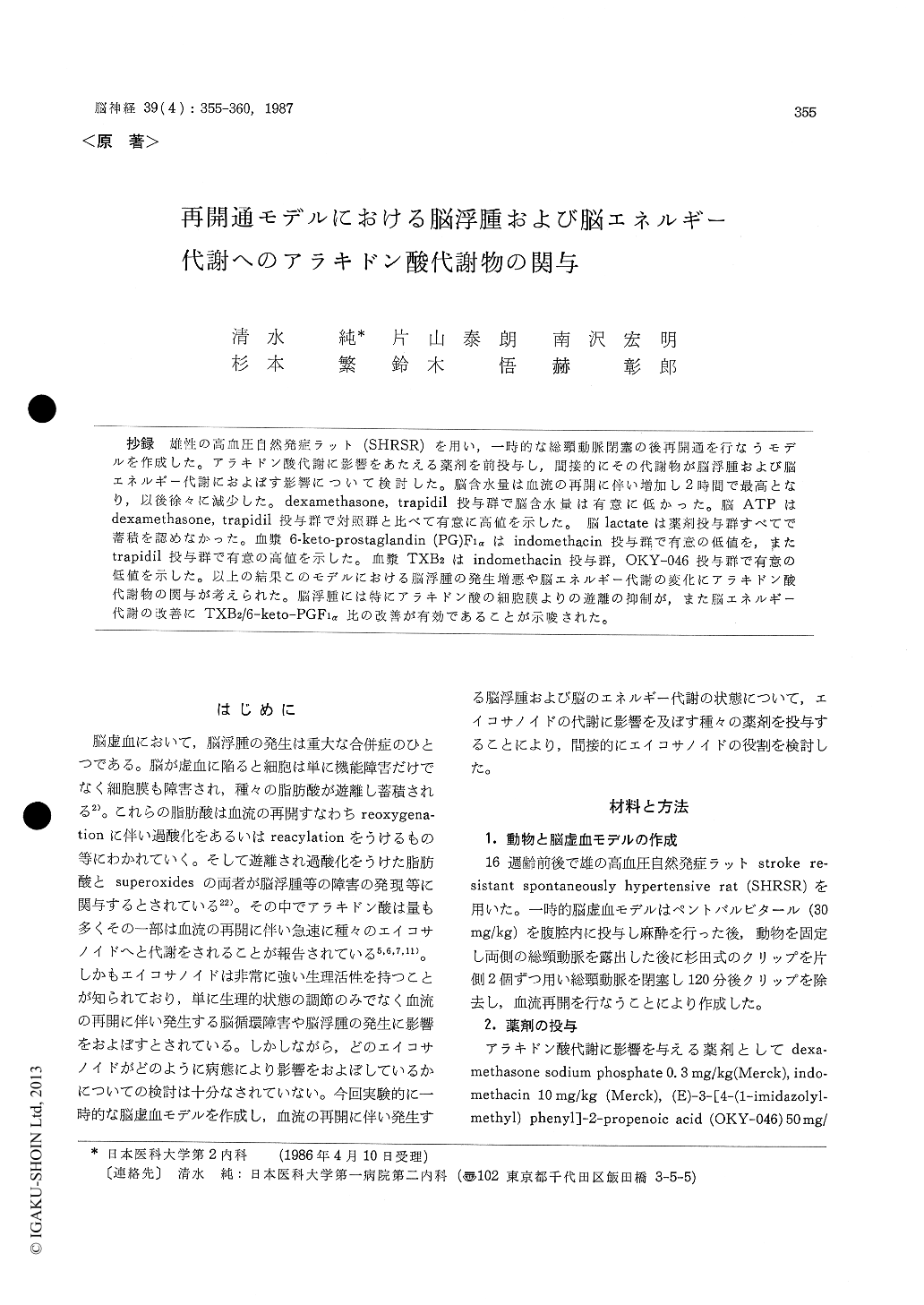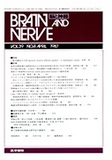Japanese
English
- 有料閲覧
- Abstract 文献概要
- 1ページ目 Look Inside
抄録 雄性の高血圧自然発症ラット(SHRSR)を用い,一時的な総頸動脈閉塞の後再開通を行なうモデルを作成した。アラキドン酸代謝に影響をあたえる薬剤を前投与し,間接的にその代謝物が脳浮腫および脳エネルギー代謝におよぼす影響について検討した。脳含水量は血流の再開に伴い増加し2時間で最高となり,以後徐々に減少した。dexamethasone, trapidil投与群で脳含水量は有意に低かった。脳ATPはdexamethasone, trapidil投与群で対照群と比べて有意に高値を示した。脳lactateは薬剤投与群すべてで蓄積を認めなかった。血漿6-keto-prostaglandin (PG) F1αはindomethacin投与群で有意の低値を,またtrapidil投与群で有意の高値を示した。血漿TXB2はindomethacin投与群,OKY−046投与群で有意の低値を示した。以上の結果このモデルにおける脳浮腫の発生増悪や脳エネルギー代謝の変化にアラキドン酸代謝物の関与が考えられた。脳浮腫には特にアラキドン酸の細胞膜よりの遊離の抑制が,また脳エネルギー代謝の改善にTXB2/6—keto-PGF1α比の改善が有効であることが示唆された。
The involvements of arachidonic acid metabo-lites in the development of ischemic brain edema and cerebral energy metabolism were investigated on the experimental ischemia and reperfusion model.
The level of arachidonic acid in brain tissue increases especially on the ischemic insult, which is rapidly converted to prostaglandins and leuko-trienes after the reperfusion. The drugs which modify the arachidonic acid metabolism were ad-ministrated to clarify the effect on ischemic brain edema and cerebral energy metabolism. Male stroke resistant spontanously hypertensive rats (SHRSR) were subjected to incomplete ischemia for two hours by occlusion of both common carotid arteries with vascular clips, and reperfused for two hours. The drugs used are dexamethasone, indomethacin, trapidil and OKY-046. Indometha-cin inhibits cyclooxygenase. Dexamethasone in-hibits phospholipases by the production of lipo-cortin. OKY-046 inhibits thromboxane A2synthe-tase. Trapidil inhibits thromboxane A2 synthetase and increases the level of 6-keto-PGF1α.. These drugs were administrated 18 hours before, just after clipping on (1/2) and off (1/2). Brain water content, cerebral ATP and lactic acid levels were examined. In the saline treated group, the cere-bral water content was increased after the reperfu-sion and reached its maximal level after two hours of the reperfusion. The development of brain edema was prevented by the administration of dexamethasone or trapidil, but not by indome-thacin and OKY-046.
Administration of trapidil or dexamethasone was found to prevent the decrease in ATP and the increase of lactic acid. In the indomethacin admin-istrated group, only the increase of lactic acid was prevented. 6-keto-PGF1α was high in the trapidil administrated group and low in the indo-methacin administrated group. TXB2 level was low in the indomethacin group and in the OKY-046 group. The involvement of arachidonic acid cascade in the development ischemic brain edema was investigated. It is shown that the cerebral energy metabolism and brain edema were influ-enced by various stimulations and inhibitions of the arachidonic acid cascade metabolites, which may indicate the involvements in the ischemic damage. The decrease of thromboxane B2/6-keto-PGF1α. may improve the microcirculation and the cerebral energy metabolism, but has no effect on the inhibition of cerebral edema formation.
From the results of dexamethasone and indo-methacin administrations, it can be suggested that lipoxygenase metabolites may be participate to the aggravation of cerebral edema.

Copyright © 1987, Igaku-Shoin Ltd. All rights reserved.


